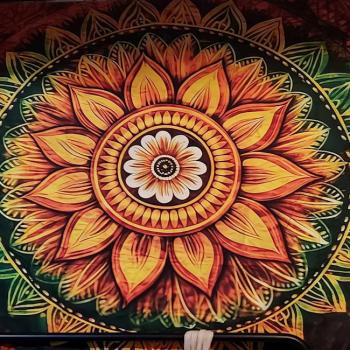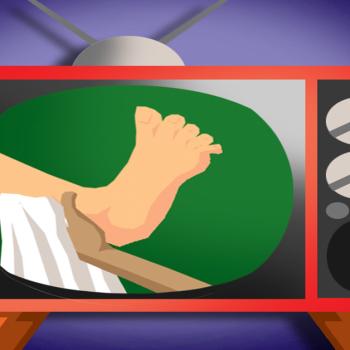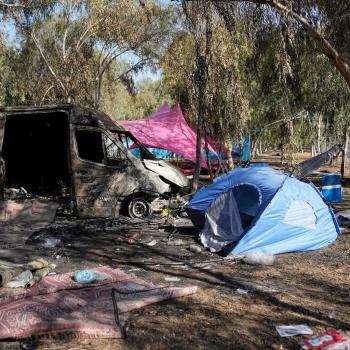The story I see in the Eucharist is one of God's love for humanity and creation. It is a declaration of the material world and human relationships as being full of worth and value. Ordinary bread and wine become extraordinary when they are used to tell God's story. An ordinary child is named as an extraordinary and unique creation of God and becomes initiated into Christian community. In marriage, ordinary human people have their union blessed, two ordinary people becoming something new and extraordinary.
In the story of God, the ordinary is made extraordinary and the material world is named as a site of God's revelation, self-giving, and grace. Instead of a fallen, broken world, what is revealed is that the ordinary things we surround ourselves with, and the ordinary lives we live, are infused with the presence of God. Sin is when we become convinced of our brokenness, or separation from God, and believe that the ordinary is mundane. The world is bread and wine.
Sacrament of Agape
The Christian Eucharist as we have it today -- sometimes called The Lord's Supper or Communion -- has a variety of ancient roots. In part, it is inspired by the Shabbat meal of Judaism, and in part it is inspired by the meals of Jesus, including the Last Supper, shared with his disciples. Early Christian communities would gather to share a meal as community. In the face of Roman occupation and the displacement of human bodies and lives, the Christian communities would form families that would break bread together that crossed gender, racial, ethnic, and prosperity lines. It is for this reason that Paul throws something of a fit when he hears of communities where the rich gather early so they do not have to feast with their poorer members.
The early Christian communities were a radical departure from the hierarchal structure of life in the Roman Empire. In the Christian communities, your slave could be your priest and your mother could be your bishop. Everywhere in the empire, bodies were being displaced by war and politics but the Christian church with its view of one, universal, and welcoming God knit them altogether into a community that was in its simplicity and blandness a radical statement about the world and God's love for it.
As Christian tradition developed, the meal portion of worship became a much simpler event of bread and wine and was transformed into a ritual. Oftentimes in churches today -- in the more liturgical traditions in particular -- lay people are told they can hold an Agape meal in a private worship or retreat. In other cases a church will hold a potluck or meal after worship and call it an Agape meal. In one form or another, the powerful meal that the early Christian communities held in order to tells God's story has almost lost its power. Even uber-conservative communities will only have communion four times a year, at the clergy's discretion. They may have a theology that says any member may perform the communion, but power is still maintained by the clergy.
In a Sacrament of the Agape we begin to recognize that the Agape is what happens when we form community in the face of oppression -- like members of the LGBT community gathering to celebrate each other, to march in a pride parade, or declare their presence in our churches. It is what happens when we make a table that welcomes all to it. It is what happens when we feast in front of the powers that wish to control the nature of God's grace. Agape happens when we share meals with those who are sick, dying, broken, and hurting. Agape happens when we share meals to celebrate our love, passion, and friendship.
What a priest or clergy does on Sunday is a show; it is a reminder and empowerment of the Sacrament we all perform or are called to perform during the week. The priesthood of the believer is called to perform sacraments in the world, and the priest is a person set aside to remind us through ritual of what our calling is. The sacrament of the agape meal is the radical notion that we can make a table in front our enemies and ask them to join us.
Sacrament of the Other
Growing up in the American South, I often encountered racism and prejudice. Sometimes overtly and occasionally in my own words and actions as a young person, I absorbed the latent prejudices from my surrounding culture. At its heart, prejudice and racism stem from a fear of the Other and otherness. Otherness is the danger we perceive in cultures and people who fall outside of our cultural normative assumptions. The Other is the one who carries our own fears back to us and confronts us with the limits of our own human capacity. The Other is the one who is dangerous for our assumptions and makes livable realities of all we had deemed off-limits, be they sexual and relational realities or cultural and ethnic realities.
Fear of the Other can sometimes be a fear of our own otherness. Often when we project our own fears or secret transgressions on to the Other -- other races, genders, sexual orientations, politics, and philosophies -- we are often projecting what we most fear about ourselves. In America today, the fear of Otherness is running rampant in the form of the Tea Party movement and its fear of ‘un-American liberals' and the various homophobias that wish to present LGBT people from achieving equal rights.




